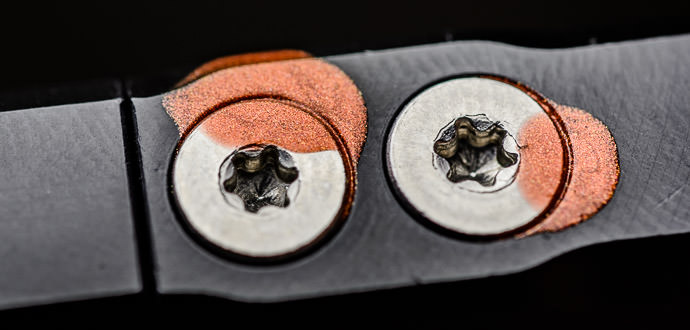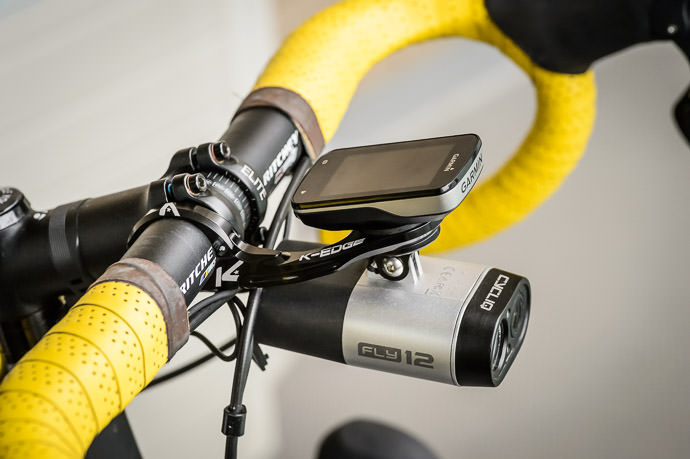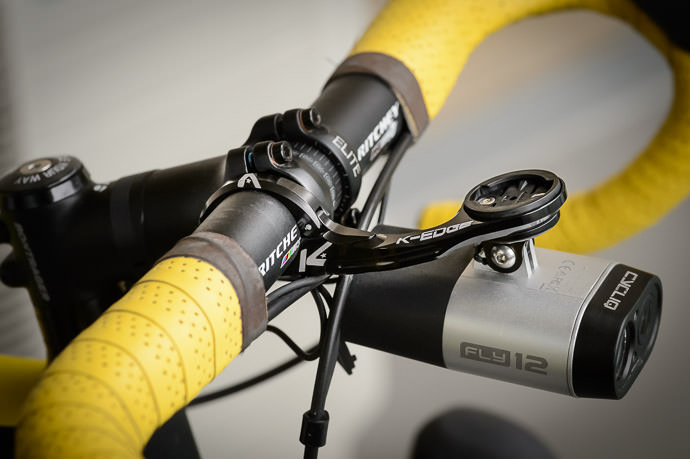
Nikon D4 + Voigtländer 125mm f/2.5 — 1/800 sec, f/5.6, ISO 6400 — image data
Giving It Another Try
K-EDGE has restored my trust in its mount
Two weeks ago in “Pleasant Social Ride to Onyu Pass” I reported about how the K-EDGE bicycle mount for my cycling computer and front video camera had failed on a bumpy downhill. I had been using a K-EDGE Garmin Mount XL to hold a Garmin Edge 820 and a Cycliq Fly12.
The summary of this followup is that I am now using another copy of the same mount, and that I think it can be trusted if you don't touch the two screws joining the halves of the mount together. Details follow.
In the post two weeks ago, I included this photo showing the bike-side half of the mount with part of a sheared-off bolt sticking out:
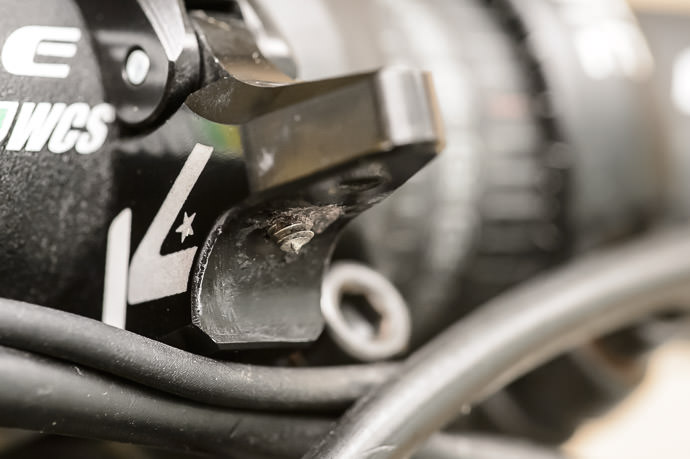
Nikon D4 + Venus 60mm Super Macro f/2.8 — 1/320 sec, f/5.6, ISO 6400 — image data
Fate of the Earlier Mount
one bolt gone, the other ripped in half
Modern mounts from K-EDGE see to come in halves joined by two screws:
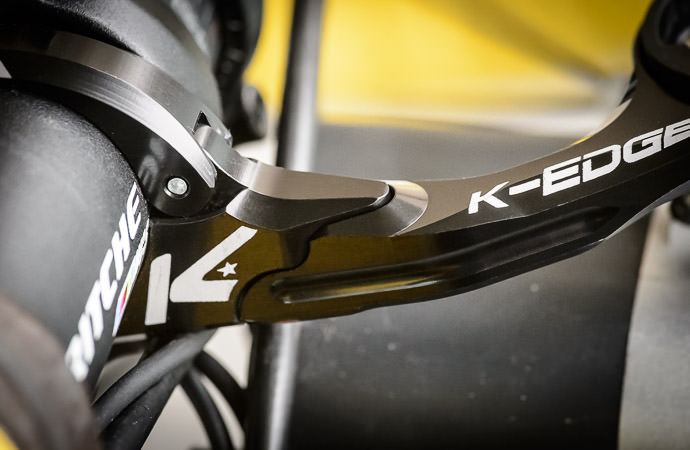
Nikon D4 + Voigtländer 125mm f/2.5 — 1/320 sec, f/5.6, ISO 6400 — image data
Junction Between the Halves
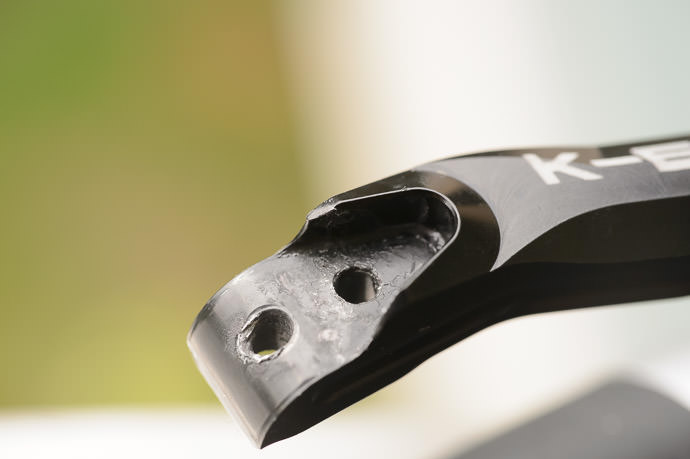
Nikon D4 + Venus 60mm Super Macro f/2.8 — 1/640 sec, f/5.6, ISO 3600 — image data
Accessory Side of the Mount
with holes for two screws
I suppose this two-part design makes it easier to offer a wide variety of bike-mount solutions, since they don't have to design and manufacture every permutation of “attaches this way” and “supports these accessories”. Having mutually-interchangeable halves lets them mix and match on the fly.
To recap about the failure I experienced two weeks ago, while riding down a very fast, bumpy descent, the whole thing appeared to snap in half at a particularly nasty bump. Inspecting it later showed that one of the pair of bolts had snapped, and that the other was missing. My guess is that one bolt had worked loose at some point, leaving all the stresses to the other bolt, now compounded by the extra leverage the lack of the second bolt created.
A few things lend credence to my theory. One is that some weeks/months back, during a less-bumpy ride, I had noticed that one of the bolts had worked loose. I was happy to catch it before it got lost, and tightened it up. So, a bolt working loose is not without precedent.
Second is that the video of the descent prior to failure was ridiculously shaky... the extra “give” from the lost bolt showing up in the result.
What still perplexes me, though, is that after noticing the loose screw the first time, I used Loctite 222 to secure them both. I think that there are more different Loctite products than atoms in the universe, but this seemed to be an appropriate one for this situation. Yet, the screw was nowhere to be found. (Had the first screw also broken in half, part of it would have remained in the mount just as part of the second screw remained in the mount.)
K-EDGE mounts are well respected, and the one I had is highly rated at Amazon by what seem to be real reviews. The bolts aside, it seems rock solid, so I sent them a note asking whether they had a unibody version of the mount.
I didn't expect much. A different company (TiGRA), for example, didn't even response when I reached out to them after their mount disintegrated, sending my iPhone 6+ smashing into the pavement.
But K-EDGE responded right away. They noted that they tend to see this kind of separation after a crash. I suppose that in the case of a crash, such a separation is a feature: the mount separates upon impact, lowering the stress on your much-more-pricey bike and accessories (or, more importantly, giving way to your body being flung about instead of impaling a cycling computer in your gut).
In my note to them I didn't ask for anything but information, but in their first response they asked me to fill out a warranty/return form, and asked for more details about the failure. I sent them a bunch of photos and the video that my Fly12 was taking at the time of the failure.
Their second response, which came equally quickly, is a model for excellent customer relations. They had never seen a failure like this, which one supposes would make them skeptical of the story they were hearing, but if they harbored any suspicion, they kept it to themselves. First they addressed the current situation: they said they were expressing me two copies of the mount (at their expense, to my address in Japan, even though I had bought the mount in America), which I could do with what I wanted. They noted that if I didn't trust the mount, I could sell them to fund whatever mount solution I might decide to go with. That last bit about selling them showed me that they weren't just going through the “give him something to shut him up” motions. They truly cared. Seth Godin would be proud. I was impressed.
Then on to why the mount failed in the first place. They said that thought that perhaps “the bolts were over torqued causing them the break under extreme stress”.
This mention of “over torqued” obviously means "we think you must be inhumanly strong... Superman must cower in your presences, and women must swoon at your devastating good looks". It's a plainly-superficial attempt to flatter, and, I must say, remarkably effective. 😀
Seriously, though, I highly doubted that I had over-torqued them, but a couple of messages later they informed me that the torque specification for these screws is 0.88 Newtons. That seems ridiculously low to me... about finger tight? If that's the case, then yes, I certainly did over-tighten them.
There is no mention of this on their web site, the product packaging, or the product itself. That's a big problem. They said they're in the process of updating things to make this information available, but at the moment the only place one can find this information seems to be this blog post. I hope it helps someone.
At this point I don't fully understand why there was a failure, and especially how a bolt could have come loose and gotten lost when I had secured it with Loctite. Maybe the Loctite product I used wasn't appropriate, or maybe I just didn't apply it properly. Or maybe it has a shelf life that I exceeded. (I've had it lying around for ages.)
In any case, I'm willing to give the mount another try so long as I don't mess with the two little screws, leaving them just as they arrived. However, still being a bit leery of the screws, I marked them with nail polish so that I can see at a glance if they make any movement:
For the first few rides I also wrapped them with tape, to physically restrict their ability to just fall out....
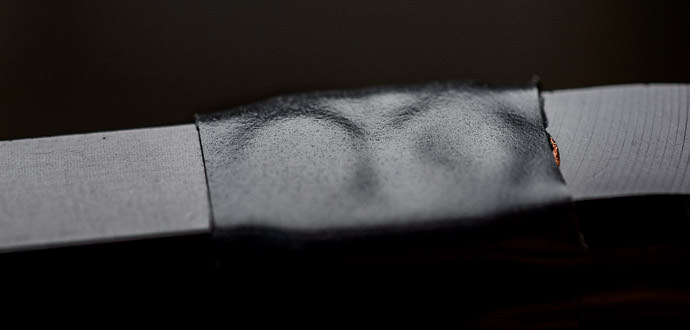
Nikon D4 + Venus 60mm Super Macro f/2.8 — 1/30 sec, f/4, ISO 450 — image data
Swaddled Like a Newborn
I rode hundreds of kilometers and there was no apparent movement in the screws, so I got rid of the tape.
The bike-side part is attached to the bike with a screw, and for this screw the unit itself is marked “Max 2Nm”, so I took care to respect that:
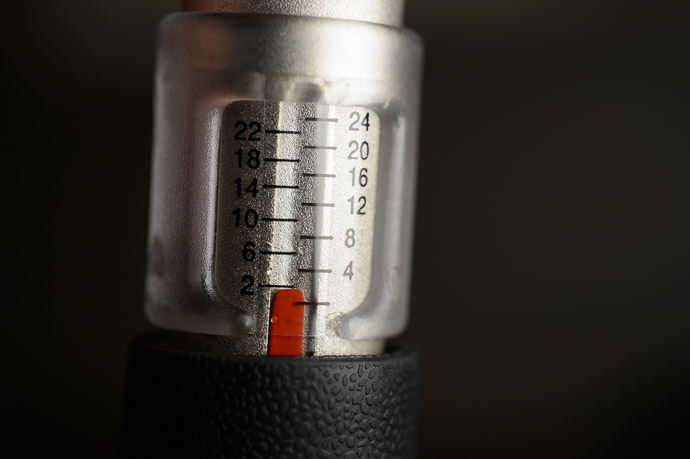
Nikon D4 + Venus 60mm Super Macro f/2.8 — 1/30 sec, f/4, ISO 560 — image data
A Bit Shy Of 2 Newton-meters
And of course I'll still certainly use the cord that came with the Fly12 to tether the whole thing to the bike; it saved everything the first time.
So there we have it. K-EDGE seems like a great company with a great product that has not-so-great instructions that most folks won't notice (because most folks, I'd guess, won't fiddle with the screws to begin with). But it seems the tightness really matters, so the information should be out there; that it's not reflects back on the company reducing its “great” rating. Hopefully they can get their site/packaging updated and remove all qualifications for “great”.

Nikon D4 + Nikkor 70-200mm f/2.8 @ 70mm — 1/320 sec, f/9, ISO 720 — map & image data — nearby photos
near Onyu Pass (おにゅう峠の近く)
in the mountains way north of Kyoto, Japan
I just got back from yet another ride to Onyu Pass, the fourth in half as many weeks. (The first three were blogged about here, here, and here.)
This time, like the first, I went with a group of friends. Also like the first, I brought along the real camera (Nikon D4), but this time I also brought some real lenses. I haven't looked at all the photos yet, wanted to post a few.

Nikon D4 + Nikkor 70-200mm f/2.8 @ 70mm — 1/320 sec, f/6.3, ISO 320 — map & image data — nearby photos

Nikon D4 + Nikkor 70-200mm f/2.8 @ 125mm — 1/320 sec, f/11, ISO 1100 — map & image data — nearby photos
To be continued...

Panasonic LX100 at an effective 54mm — 1/125 sec, f/4, ISO 200 — map & image data — nearby photos
Autumn Encroaches on Onyu Pass
Onyu Pass (おにゅう峠)
Monday, Oct 31, 2016
So, I made a third cycle ride in a row up to Onyu Pass the other day. The first trip on a Monday was a lazy social ride of 149km (93mi). Later that week I did a faster solo ride that topped out at 165km (103mi).
This third trip the Monday following the first ended up being 206km (128mi).
I had three goals for the ride. The first was to improve my time on the 58km (36mi) mountainous stretch from the Ichihara area of Kyoto to the top of Onyu Pass. This involves a mile of elevation gain (more precisely, 1,605m or 5,266') including the major climbs up Hanase Pass, Nomi Pass, and of course the final Onyu Pass.

Panasonic LX100 at an effective 24mm — 1/125 sec, f/5.6, ISO 200 — map & image data — nearby photos
Above Onyu Pass
guardrail at left is the climb from the Kyoto side; at right is down toward the sea
It's not an uncommon route, I think, but the segment at Strava shows only 22 matching attempts. I guess one needs a high-quality GPS unit and some luck for the full 58km of mountains to actually match the segment track.
Moreover, the entire segment of three major climbs is not something one would normally try to do in one shot, but rather pause along the way between the major climbs.
I mention all this to explain why I had the KOM (the “King of the Mountain”... the fastest registered time) going into this. My time of three hours 17 minutes wasn't all that fast and included 16 minutes spent fixing a flat. Still, when I did it was better than #2 by more than half an hour.
Fast forward to this past Monday when I started this ride, someone had moved to within just four minutes of my KOM time. Barring another flat tire I knew I'd pull farther ahead, so I gave it a good go....
I thought I might PR (make a new personal record) on the first and biggest climb to Hanase Pass, but I actually missed it by a whopping 10%. I didn't make PRs on any of the climbs, but did well on the connecting segments and didn't make any rest stops (or any stops at all... the wheels on the bike never stopped turning for the entire segment). I finished in just under two hours 41 minutes, improving my previous time by 37 minutes.
Any number of my friends could beat this if they made any effort to do so, but at least now it's less of a low-hanging fruit.
Anyway, I retraced my steps back down from Onyu Pass for a while to where I could take the photo that leads this post. Last year on my blog I included a summer view from the same vantage point.

Panasonic LX100 at an effective 24mm — 1/320 sec, f/5.6, ISO 200 — map & image data — nearby photos
Wider View
of the leading photo

Panasonic LX100 at an effective 50mm — 1/125 sec, f/5, ISO 200 — map & image data — nearby photos
Doesn't Quite Work
trying to get the twisty road in the background and bike in the foreground
Goal #2 for the ride was to explore the northern descent from Onyu Pass. I'd climbed from the south seven times, but had always returned back down the south toward Kyoto. This time I wanted to head north, toward Obama and the sea.

Panasonic LX100 at an effective 24mm — 1/160 sec, f/5.6, ISO 200 — map & image data — nearby photos
Gravel Toward the South
The road turns to gravel at the pass, and I worried about trying such a steep descent on gravel with 25mm road-bike tires, but lately had been hearing that it was doable, so I gave it a shot.

Panasonic LX100 at an effective 58mm — 1/125 sec, f/4.5, ISO 200 — map & image data — nearby photos
Discarded Ribbon
I was surprised to find that though the descent starts with gravel, there are many paved sections, so it wasn't nearly as bad as I thought.
It also appeared to suffer a lot of guardrail-crushing avalanches.

Panasonic LX100 at an effective 75mm — 1/125 sec, f/4.5, ISO 200 — map & image data — nearby photos
Halfway Down
looking north
( we'll be passing by the roof in the center of the photo soon )

Panasonic LX100 at an effective 24mm — 1/125 sec, f/3.5, ISO 200 — map & image data — nearby photos
One of the Gravel Areas
these gravel areas are not bad, road-bike wise

Panasonic LX100 at an effective 24mm — 1/125 sec, f/2.2, ISO 200 — map & image data — nearby photos
Water Stop
Since I had done the dash from Kyoto to Onyu Pass without stopping, I had only the one bottle of water with me, which I finished off while resting at the top. Lacking stores and vending machines in the middle of nowhere, I kept an eye out for a road-side stream I could fill up at, and finally found one 20 minutes into the descent (4½ hours into the ride).

Panasonic LX100 at an effective 24mm — 1/125 sec, f/5, ISO 200 — map & image data — nearby photos
Freaky Fake Rock Wall
likely covering a real rock wall

Panasonic LX100 at an effective 41mm — 1/125 sec, f/4, ISO 200 — map & image data — nearby photos
First Sign of Civilization
the rooftops seen in “Halfway Down” above

Panasonic LX100 at an effective 35mm — 1/125 sec, f/2.3, ISO 200 — map & image data — nearby photos
Typical Rustic Scene

Panasonic LX100 at an effective 32mm — 1/125 sec, f/2.2, ISO 200 — map & image data — nearby photos
Mossy Dead End
I had scoped out the satellite photos for offshoot roads, but all were either gravel, or just sort of became nothing like this one.

Panasonic LX100 at an effective 34mm — 1/125 sec, f/2.5, ISO 200 — map & image data — nearby photos
Half a House
along the side of the road

Panasonic LX100 at an effective 75mm — 1/125 sec, f/2.8, ISO 400 — map & image data — nearby photos
If Buildings Could Talk
I imagine this one could tell quite a story

Panasonic LX100 at an effective 24mm — 1/125 sec, f/3.5, ISO 200 — map & image data — nearby photos
Lovely Mountain Road
Eventually I emerged from the mountains into the farms surrounding the city of Obama, and quickly made my way to the standard “I made it to Obama” photo spot...

Panasonic LX100 at an effective 24mm — 1/320 sec, f/5.6, ISO 200 — map & image data — nearby photos
I Made It To Obama
Mermaid Beach (人魚の浜海水浴場)

Panasonic LX100 at an effective 31mm — 1/125 sec, f/5.6, ISO 200 — map & image data — nearby photos
Impressed With My Stats
This was my fourth time to ride to/through Obama from Kyoto. The first time was last July. The second time was this July. The third time was early last month, and this fourth time was last Monday.

Panasonic LX100 at an effective 24mm — 1/125 sec, f/5.6, ISO 200 — map & image data — nearby photos
Farmer Works His Fields
On the way home I decided to take the road that goes over Gonami Pass, a road I took on the way to Obama on my first two trips there, but I'd not yet taken the opposite direction. I took my sweet time on it, stopping for photos and such, and generally just going slowly.

Panasonic LX100 at an effective 24mm — 1/125 sec, f/1.7, ISO 200 — map & image data — nearby photos
Pretty Park Area
that I normally see only in a blur while speeding down this descent

Panasonic LX100 at an effective 24mm — 1/60 sec, f/1.7, ISO 800 — map & image data — nearby photos
Standard “Japan Mountain Road” Pretty

Panasonic LX100 at an effective 24mm — 1/125 sec, f/1.7, ISO 250 — map & image data — nearby photos
Cresting Gonami Pass
五波峠
taken while cycling at 16 kph (10 mph)
This is normally a spot to pause to rest and take photos (like this and this), but having spent a lazy hour making the climb to the top, I decided to not waste time and zip down. Got the KOM for the descent.
From there perhaps the most direct way home would have been over Sasari and Hanase Passes, but having recently climbed Sasari Pass thrice in one ride, and having recently climbed and descended Hanase Pass in the dark on two recent longer-than-expected rides (this and this), I decided to take the only other route available, through Miyama.

Panasonic LX100 at an effective 65mm — 1/125 sec, f/2.8, ISO 500 — map & image data — nearby photos
Passing Through Miyama
美山
Another reason I didn't want to go the other direction is that it would have meant the last 20km or so would have been the same as the first 20km, resulting in the track on the map looking like this. (That's Neil Holt's ride two days before mine, resparking the idea to try the northern descent from Onyu, and giving me the idea to return via Gonami.) It's stupid to care what the track looks like on the map, but I prefer big loops instead of lollipop-shaped “loop on a stick” tracks.
Anyway, two hours later I'm descending into Kyoto from Kyomi Pass, and am surprised to see the lights of the city flickering behind a thin veil of trees for almost the entire descent. During the day, one can see the city only through one or two brief breaks in the trees.

Panasonic LX100 at an effective 65mm — 1/8 sec, f/2.8, ISO 3200 — map & image data — nearby photos
Descending Kyomi
By the time I'd rolled into the city I had about 200km (125mi) under my belt, and my legs were sore, so I stopped by Ken-chan's clinic for a wonderful (and wonderfully-painful) massage. It did wonders. While there, I developed a craving for chicken karaage, so headed off to a great hole-in-the-wall place I had been to years ago, after this wine-tasting event.
My legs felt great, but sadly, the restaurant had closed in the intervening years, so I returned to a place closer to home and ate two full portions. It was totally delicious.
My legs were killing me the next day.
So, that was three trips to Onyu Pass in a week. It looks like some friends are going next Monday, so I'll probably ride along with them.

Panasonic LX100 at an effective 75mm — 1/320 sec, f/5.6, ISO 200 — map & image data — nearby photos
Really Windy
note the completely-horizontal wind sock just right of center
( it's actually a koinobori, but still blown horizontal by the wind )
After the really pleasant social ride to Onyu Pass most of the way toward the ocean, far north of Kyoto the other day, I thought to more or less do the same ride again by myself, to do some things that would be inappropriate on a social ride: ride fast, and pause to explore tangential areas.
I started off zipping up and over Hanaore Pass the 40+km (~26 miles) to the village of Kutsuki in about an hour forty five minutes (as opposed to two and a half hours on the social ride), then immediately lost any gains in the schedule to some exploring...

Panasonic LX100 at an effective 24mm — 1/125 sec, f/3.2, ISO 200 — map & image data — nearby photos
Road Off to the Right
I wonder where you go...
I knew from previous geeking over satellite photos that there were some roads in this area that appeared to climb up into the mountains a short while, and that this was one of them. Other than that, I didn't know what to expect, so just took it to find out.

Panasonic LX100 at an effective 24mm — 1/125 sec, f/5.6, ISO 200 — map & image data — nearby photos
Up Up Up
I used the in-camera indicator to make sure the camera was exactly level for this picture, and perhaps if you remind yourself that while staring at the center of the frame, the steepness of the road will become apparent. Or maybe not.
It turned out to be 1km at 10%, which is steep but not crazy. (The segment is 994 meters long, which of course in Strava's weird-math universe rounds to “0.9km”.) The road surface was lovely.
The road abruptly ends at what looks like two gravel parking lots, and continues as a gravel path up into the mountain. The two “gravel parking lots” are really the former locations of buildings (some kind of prefectural nature center), but now that the places are cleared, they really don't want folks parking on them... they blocked off the entrances with a mound of dirt, bollards, and rope:

Panasonic LX100 at an effective 35mm — 1/250 sec, f/5.6, ISO 200 — map & image data — nearby photos
Entrance Denied
Bird photographers were parking along the road to then walk up the gravel path. It would have been nice to have these areas open.
Just a little bit before the end of the pavement, there's a tiny road running off to the north....

Panasonic LX100 at an effective 27mm — 1/125 sec, f/3.5, ISO 200 — map & image data — nearby photos
I Wonder Where This Goes

Panasonic LX100 at an effective 24mm — 1/60 sec, f/1.7, ISO 320 — map & image data — nearby photos
Very Steep
but at least it's wet and slippery

Panasonic LX100 at an effective 28mm — 1/80 sec, f/2.1, ISO 640 — map & image data — nearby photos
Descent into Richness
the area had such a lovely, earthy mood, with wonderful light
And then suddenly...

Panasonic LX100 at an effective 28mm — 1/160 sec, f/5.6, ISO 200 — map & image data — nearby photos
Suspension Bridge
オグラス山吊橋

Panasonic LX100 at an effective 65mm — 1/160 sec, f/5.6, ISO 200 — map & image data — nearby photos
Still Windy
path-marking ribbon fluttering horizontally

Panasonic LX100 at an effective 50mm — 1/125 sec, f/5, ISO 200 — map & image data — nearby photos
As Thick as my Arm

Panasonic LX100 at an effective 75mm — 1/125 sec, f/3.2, ISO 200 — map & image data — nearby photos
Looks Like a Toy
lack of small details make this huge anchor look like a toy

Panasonic LX100 at an effective 67mm — 1/125 sec, f/4.5, ISO 200 — map & image data — nearby photos
Bridge Plaque
“Ogurasu Suspension Bridge”
March 1990

Panasonic LX100 at an effective 24mm — 1/250 sec, f/5.6, ISO 200 — map & image data — nearby photos
Old Instructions
The “400m to the right” place is now an unaccessable parking lot,
so what will I find 600m to the left?
Let's find out...

Panasonic LX100 at an effective 24mm — 1/125 sec, f/2.8, ISO 200 — map & image data — nearby photos
Up Up Up

Panasonic LX100 at an effective 25mm — 1/125 sec, f/5, ISO 200 — map & image data — nearby photos
Flattening Out
but still feels like the middle of nowhere

Panasonic LX100 at an effective 25mm — 1/125 sec, f/5, ISO 200 — map & image data — nearby photos
Civilization
opens out into a park area with a baseball field
グリーンパーク

Panasonic LX100 at an effective 28mm — 1/125 sec, f/2.1, ISO 200 — map & image data — nearby photos
Awesome Climbing Area

Panasonic LX100 at an effective 28mm — 1/125 sec, f/3.5, ISO 200 — map & image data — nearby photos
Bocce-Ball Players

Panasonic LX100 at an effective 35mm — 1/125 sec, f/5.6, ISO 200 — map & image data — nearby photos
Roller Slide!!
smaller version of this kind of awesome
( sadly, it looks too small for me to even try )

Panasonic LX100 at an effective 24mm — 1/125 sec, f/5, ISO 200 — map & image data — nearby photos
Massive Structure Covering.... Nothing
So, that was a fun place to explore. Heading back toward the bridge, I came to a place where the road diverged in the yellow wood...
The first time by I'd looked down the other path as far as I could to where it bent in the undergrowth, but left it for another day, but now that I was right back here, I thought I'd actually take it. It did not disappoint.

Panasonic LX100 at an effective 24mm — 1/125 sec, f/3.2, ISO 200 — map & image data — nearby photos
Fabulous Toilets

Panasonic LX100 at an effective 28mm — 1/125 sec, f/3.5, ISO 200 — map & image data — nearby photos
Spacious Rest Area

Panasonic LX100 at an effective 24mm — 1/125 sec, f/3.2, ISO 200 — map & image data — nearby photos
Road Turns to Gravel
so I turned around
I retreated back across the bridge, up the short super-steep super-wet section (somehow safely), then down the initial “where does this go?” climb, and continued on matching the route from the other day's social ride.

Panasonic LX100 at an effective 33mm — 1/250 sec, f/5.6, ISO 200 — map & image data — nearby photos
Crossing Into Kutsuki Village
After a short stop at the only convenience store for miles around, I made the Ohikodani climb a bit faster than on the social ride, though at 23½ minutes, still more than two minutes slower than Ionut did.
A hiking trail crosses the at the road pass, climbing up the mountain on both sides of the road. I climbed up the southern side for a bit, yielding a nice view:
After descending back down to the main road, I made the 10km slog mostly up hill to the base of the day's main event, the climb to Onyu Pass. I gave it a good go. It was quite windy on the open road, but during the climb there was wind only on some of the hairpins, dropping off soon after. Wasn't too bad.

Panasonic LX100 at an effective 52mm — 1/160 sec, f/5.6, ISO 200 — map & image data — nearby photos
Onyu Pass
おにゅう峠
I was very happy to better my previous time by two minutes, setting a new PR at 22:22. Overall it's only 20th best, though out of all riders 85kg (187lb) or above, I'm the better. 🙂

Panasonic LX100 at an effective 35mm — 1/160 sec, f/5.6, ISO 200 — map & image data — nearby photos
Standard Onyu View

Panasonic LX100 at an effective 24mm — 1/125 sec, f/2.8, ISO 200 — map & image data — nearby photos
New Sign
gorgeously crafted with obviously high skill
The only other time I'd done the descent alone and not stopped for photos along the way, I'd not thought about doing it quickly... I just descended to get home.... but I still ended up setting the KOM (“King of the Mountain”... the fastest registered time) by a wide margin. This time, for the first time, I consciously thought about doing it quickly, and so improved my time by a minute, to 8:01. It's a fun descent, but would be much more fun without so many rocks strewn all over the road.
At the base of the climb, instead of returning directly home, I thought to explore a road that heads off to the west. I was rewarded with a lovely, quaint village...

Panasonic LX100 at an effective 38mm — 1/125 sec, f/2.5, ISO 200 — map & image data — nearby photos
Road Continues Up Into the Forest

Panasonic LX100 at an effective 24mm — 1/125 sec, f/2, ISO 200 — map & image data — nearby photos
End of the Road
for me... I'll leave gravel for others
For the most part it wasn't too hard a day... lots of relaxing periods punctuated by some more-earnest efforts. But on the way home, at about the 125km (77mi) point, I realized that something I carry in one of the bike's bottle cages was missing. I was sure it had bounced out during one of the horribly-rough parts of the descent from Nomi Pass. I was running out of time to get home, but what bounced out included a battery for my headlight that I needed to get home, so I had no choice but to return to look for it.
The battery was in a black case, and in the enveloping dusk it was getting quite dark under the thick forest treecover. Worse yet, there was a strong likelihood that if the thing bounced out while I was speeding down the mountain, it wouldn't stay nicely on the road for me to find, instead flying off into the river that the road parallels.
Without the battery I was worried I'd have trouble getting back in the imminent darkness. A word to St. Anthony set things straight, and there it was right in the middle of the road below one of the bumpy sections.
Now that I'd be able to get home in the darkness, my worry turned to the time. I had to meet someone at 7pm, and from experience I knew he'd come exactly as the clock struck 7pm, and not 30 seconds earlier or later. I dropped the hammer and raced toward home.
Between me and home was Hanase Pass, and I thought for sure I'd make a PR (personal record) on it, but it turns out that at 30:41 I missed my PR by 45 seconds. I would have been stoked to PR Hanase at the end of a century ride (a ride exceeding 100 miles, which this one was destined to), but it wasn't to be.
Being pitch black and having only my bike like, the descent down Hanase into Kyoto was not a time for speed, so that was slow and safe, but once back in the city I was zippy zippy zippy.
I arrived home at 6:59. While standing in front of the door to my building catching my breath, the guy I was supposed to meet walked up. As they say in Japanese, “Safe!”.
Overall the ride ended up being 165km (102.5mi), with 3,140m (10,300') of elevation:
It was (at the time, last Thursday) my 7th-longest ride and ranked 6th for elevation gain, but that's now old data. Yesterday (Monday) I did a ride that far eclipsed it, bumping it down both lists.
(For the record, today my legs rank #1 in terms of muscle ache.)

Amazon Fire TV Failure
nobody has any idea what this screen really means
( until now... this post tells you, like Amazon should have in the first place )
We wanted to be able to watch YouTube on the living-room TV, so I bought an Amazon Fire TV. Living in Kyoto, I bought the Japan-market version that they warn can be used only within Japan. Fair enough.
However, in the process of trying to get it set up, I discovered some important restrictions that they fail to disclose:
An Amazon account is required for most things to work. Not a problem for us, obviously, but would be if we were gifting it to someone.
Then, to install the YouTube app on the device, so you can watch YouTube videos on the TV via the device as they so-prominently advertise...
You must have a credit card.
You must have it registered in your Amazon account.
It must be a Japan-based credit card.
You must configure it for use with “1-click purchases”, even if you explicitly don't want that dangerous feature active.
None of these are disclosed, nor make any sense for a free app showing free content available freely, to be used on a device that you own outright. I was able to install other apps without problem.
If your situation doesn't fulfill all these requirements, you're not told an up-front “you need a Japan-based credit card configured for the 1-click feature”. Instead, you're presented the dialog shown at the top of this post and left to figure it out for yourself.
First off, it starts out with “Purchase Failure”, which is confusing because you're not trying to purchase anything. The app is free. The button to install it says “Get”. This dialog is the first hint of “Purchase” to be encountered. It makes no sense.
Then it talks about “billing address” and “payment method”, but makes no mention of where it's looking for these. It doesn't even indicate who is complaining.
Well, this error dialog pops up when merely trying to install the YouTube app, so I figure that the dialog must be from the Amazon Fire TV. YouTube is free, after all.
So, I dig through the settings in the Amazon Fire TV, and find nothing whatsoever about this. They do provide a way to purchase “Amazon Coins”, which are apparently required when wanting non-free apps, but it seems not to be relevant here.
Could it be related to the Amazon account registered to the device? I have a credit card in my account with a US billing address... is the United States not a “supported country” as far as Amazon is concerned? (I used that card to purchase this very device the previous day... did something change since then?)
I wonder whether they require a Japan-based credit card in your Amazon account. I don't have a Japan-based credit card, but Fumie does, so I re-register the Amazon Fire TV to her Amazon account.
It doesn't work.... I get the same “Purchase Failure” dialog as before.
Grasping at straws and digging around in her account settings at Amazon, I see that the billing address for her Japan-based credit card has an optional part of the address empty, so I try filling that in. It shouldn't matter, but I'm grasping at straws.
It doesn't work.... I get the same “Purchase Failure” dialog as before.
Searching all over creation (that is, The Internet), there's nothing about this until I read something related to Amazon from four years ago, suggesting that something would work if you register a credit card with their “1-click purchases” feature, in which you immediately buy something by accidentally clicking on a single link.
I try to do this in Fumie's account, but since I had made a tiny change to the billing address of her credit card, Amazon wouldn't let me use that credit card for anything new until I could prove that I actually had the card by re-entering all its details. This is a great security feature that stops people who break into your account from using your card to ship stuff to their new address, but it's really biting me now because I want to get this set up for Fumie before she gets home, but she has the card.
Along the way I submitted a help request to Amazon, and they responded promptly and politely and were completely unhelpful. First they suggested that I set the 1-click purchase method to “COD”, but that option is simply not available. Then they apologized and said that a Japan-based card is required to install any app, which I pointed out was demonstrably false since prior to trying the YouTube app I had successfully installed and used two other apps. Then they said essentially shrugged and said sorry.
In the end I got it working with Fumie's card in her account, but it was a decidedly unpleasant user experience, especially in relief of the normally delightful experience we have with Amazon. The latter is why I am a shareholder, though the former gives me pause that they will follow Apple (of which I'm also a shareholder) down the “We just don't care anymore” sinkhole. 🙁
Anyway, hopefully this will help others searching for a solution to the same problem.
